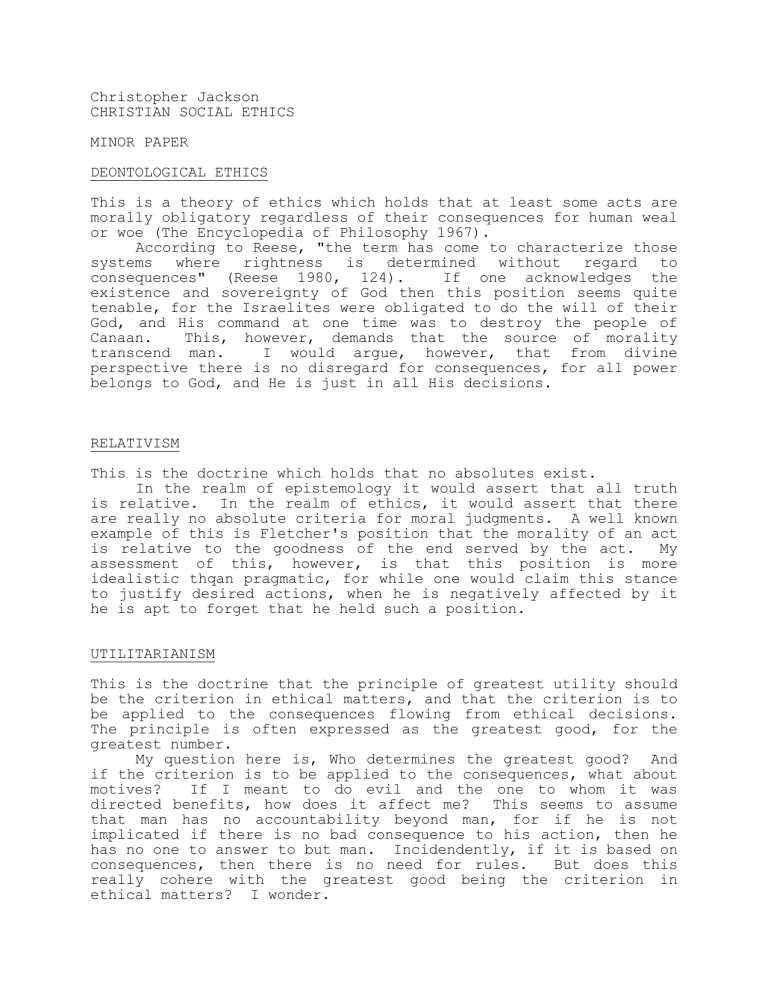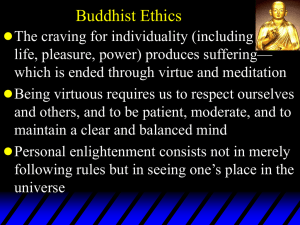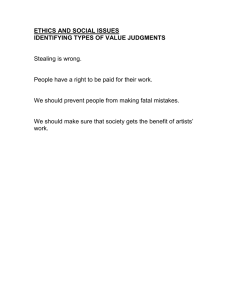
Christopher Jackson CHRISTIAN SOCIAL ETHICS MINOR PAPER DEONTOLOGICAL ETHICS This is a theory of ethics which holds that at least some acts are morally obligatory regardless of their consequences for human weal or woe (The Encyclopedia of Philosophy 1967). According to Reese, "the term has come to characterize those systems where rightness is determined without regard to consequences" (Reese 1980, 124). If one acknowledges the existence and sovereignty of God then this position seems quite tenable, for the Israelites were obligated to do the will of their God, and His command at one time was to destroy the people of Canaan. This, however, demands that the source of morality transcend man. I would argue, however, that from divine perspective there is no disregard for consequences, for all power belongs to God, and He is just in all His decisions. RELATIVISM This is the doctrine which holds that no absolutes exist. In the realm of epistemology it would assert that all truth is relative. In the realm of ethics, it would assert that there are really no absolute criteria for moral judgments. A well known example of this is Fletcher's position that the morality of an act is relative to the goodness of the end served by the act. My assessment of this, however, is that this position is more idealistic thqan pragmatic, for while one would claim this stance to justify desired actions, when he is negatively affected by it he is apt to forget that he held such a position. UTILITARIANISM This is the doctrine that the principle of greatest utility should be the criterion in ethical matters, and that the criterion is to be applied to the consequences flowing from ethical decisions. The principle is often expressed as the greatest good, for the greatest number. My question here is, Who determines the greatest good? And if the criterion is to be applied to the consequences, what about motives? If I meant to do evil and the one to whom it was directed benefits, how does it affect me? This seems to assume that man has no accountability beyond man, for if he is not implicated if there is no bad consequence to his action, then he has no one to answer to but man. Incidendently, if it is based on consequences, then there is no need for rules. But does this really cohere with the greatest good being the criterion in ethical matters? I wonder. RULE-AGAPEISM I have not found a clear definition of rule-agapeism, but from what I have heard and read on the concept, it seems to me that it refers to the ethical position which holds that the rightness of an action is determined by its conformity to the demands of the "agape" love which the Bible speaks about, and God commands to show to each other. The rule for morality therefore is agapeism. This sounds a bit similar to utilitarianism. But my big concern is, who determines what is the right expression of love? Once this left to the opinion of man it becomes a subjective morality, and I wonder if the proponents meant for it to be seen as subjective? CATEGORICAL IMPERATIVE This is the theory of ethics that sees morality as an objective requirement independent of what anyone may want. This seems to imply a confession of the existence of an objective law-giver, though Kant (the originator of the term) does not identify the source of this morality with the Judeo-Christian God. He uses "Thou shalt not kill" as an example of a categorical imperative, but for this to be independent of whatever anyone may want, it seems to me that it must necessarily transcend mankind. POSITIVISM This is a family of philosophies characterized by an extremely positive evaluation of science and scientific method (Reese 450). It asserts that all genuine knowledge is contained within the boundaries of science, and whatever questions cannot be answered by scientific methods we must be content to leave permanently unanswered (Flew 283). This seems to be implying that if a foundation for moral values cannot be derived from scientific observation, then each man must be free to practice whatever he chooses. It seems that one of the major flaws of this position is that, besides being highly humanistic, it is inclusivistic and shuts itself away from any potential knowledge which may be discovered apart from science. This position must necessarily reject the scripture. AMORAL This is the position which holds that there is a great deal in life which do not fall within the sphere of moral sense and are not to be characterized as either good or bad. They are simply non-moral. As I understand this, it applies to that which we would classify as neutral. Now if we would agree that some things can only be given a negative or a positive classification on the basis of what they are used for, then this position seems quite plausible. It seems, however, that amoral would be more appropriately applied to things than to actions, for actions necessarily affect people, while things only do so in so far as they are related to actions. NATURAL LAW ETHICS This is the view that denies a prima facie distinction between establishing facts abnout the world as it is and making a value judgments of those facts. According to this view, moral judgments just state a special subclass of facts about the natural world, that judgments about the rightness of actions are factual judgments about the quantity of pleasure they produce. This seems to assume that all moral judgments are true, but is that true? If a group of ten (10) persons are divided in opinion about the rightness of an action, could you call the position of all ten (10) factual judgments? It seems rather implausible. CASUISTRY This is the term which refers to subtle but misleading or false reasoning with respect to moral issues (Reese 83). At the inception of the term, it referred to the science of resolving problems of ethical decision by appealing to specific cases, principles drawn from scripture, canon law, traditions of the churchj, the laws of society, and the light of reason. This, in my mind, allows for the arguing of one case from various different perspectives. In such a situation one is prone to sacrifice soundness and logic for mere logic. This seems to me to be a wrong method for use in ethics. MIDDLE AXIOMS This term refers to a middle ground in questions of ethics between general statements of goals or principles and the details of policy that may be appropriate for churches to adopt. It seeks to find agreement on the general direction social policies should take and thus to guide opinion. Such agreements are provisional and subject to re-examination as circumstances change, but are helpful in guiding Christians to form judgments on issues that confront them. I am in full agreement that there is a positive aspect to middle axioms, but it seems to me that there is also a negative potential to it. The provisionality of the agreements betrays the subjectivity of it, and once there is subjectivity involved there will be some negative potential.



